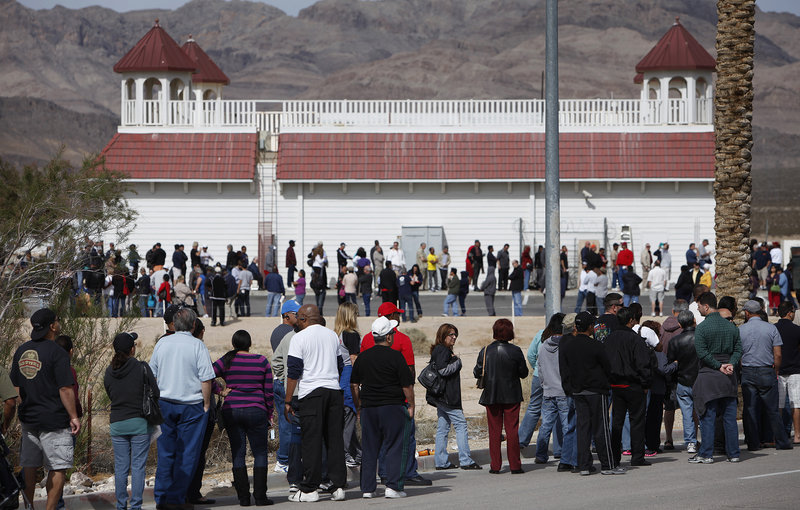Even in today’s economy, a $1.5 billion windfall would go a long way.
Forget, for a moment, about how the $640 million Mega Millions jackpot could change the personal life of the winner.
It could fund a presidential campaign several times over, make a dent in struggling state budgets or take away the gas worries and grocery bills for thousands of middle-class citizens.
It could cure the everyday worries of hundreds of thousands of American families hit by the Great Recession. It costs an average of $6,129 to feed the typical family for a year — meaning the cash spent on tickets could fill up the plates of 238,000 households.
As gas prices climb faster than stations can change the numbers on the signs, the money spent on tickets could fill the tanks of 685,000 households annually.
Or it could play politics. So far in this campaign, Republicans and President Obama have spent $348.5 million. The amount spent on Mega Millions tickets could cover that tab four times over.
Could the money dig governments out of debt? That’s a problem that even staggering ticket sales can’t solve. It could trim this year’s expected $1.3 trillion federal deficit by just over a tenth of 1 percent. In Illinois, the money would disappear just as fast into that state’s $8 billion deficit.
On a personal level, that much money staggers. Giving $1.46 billion to a broker could purchase 2.4 million shares of Apple stock. (It would also be enough to buy about 2.4 million iPads at the starting price of $499. That’s almost as many as the 3 million new iPads that Apple has already sold.)
Or consider the whimsical: A family of up to 12 could live for more than a century at Musha Cay, magician David Copperfield’s $37,000-a-night private island resort in the Exuma Cays of the Caribbean.
For a more celestial vacation, the nearly $1.5 billion wagered could purchase about 7,300 tourist tickets for a ride into space aboard Virgin Galactic’s SpaceShipTwo.
It would even buy a stake in pop culture. Want to influence the next winner of “American Idol”? If it costs a quarter to text in a vote to Ryan Seacrest, and it takes 122 million votes to win as it did last season, the money could control the outcome of the next 47 seasons.
On Friday, the lottery estimated that total ticket sales for this jackpot, which has been building up since Jan. 28, will be about $1.46 billion, said Kelly Cripe, a spokeswoman for the Texas Lottery Commission.
You’re about 20,000 times more likely to die in a car crash than win the lottery, but that doesn’t matter to most people.
“Part of it is hope. … The average person basically has no chance of making it really big, and buying a lottery ticket is a way of raising the ceiling on what could possibly happen to you, however unlikely it may be,” said George Loewenstein, a professor of economics and psychology at Carnegie Mellon University who has studied how rich and poor consumers make a choice to buy lottery tickets.
The odds are much better that someone will begin their weekend a winner. Aaron Abrams, a mathematician at Emory University, said he calculated that there was only a 6 percent chance that no one would hold the winning numbers.
“Every time the jackpot gets higher, more and more people buy tickets, which makes it more and more likely that someone will win,” Abrams said. “So the chance that it rolls over this many times in a row is very small. It’s quite a rare event.”
The estimated jackpot dwarfs the previous $390 million record, which was split in 2007 by two winners who bought tickets in Georgia and New Jersey.
The rarity of Friday’s jackpot was fueling the fervor. Lines formed at grocery stores, gas stations, liquor stops and other venues across the country.
In Arizona, a caf?orker reported selling $2,600 worth of tickets to one buyer. In Indiana, hundreds lined up for a giveaway of free tickets. Hundreds from Utah and Las Vegas streamed into neighboring California or Arizona to buy tickets because their states don’t participate.
Accountant Ray Lousteau, who bought 55 Mega Millions tickets Friday in New Orleans, knows buying that many tickets doesn’t mathematically increase his odds, and that his $55 could have gone elsewhere. He spent it anyway.
“Mathematically, it doesn’t make a difference, and intellectually we know that. But for some reason buying more tickets makes you feel more lucky,” Lousteau said. “Even people who know better are apt to feel that way.”
Send questions/comments to the editors.


